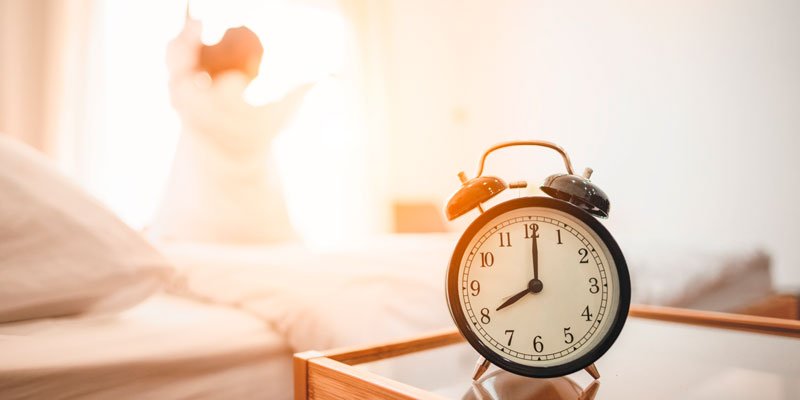Dr. Lee Surkin, Chief Medical Officer of Nexus Dental Systems, explains circadian rhythm, how it works, its connection to sleep and health, and the disorders that need to be addressed for longer and healthier life.
 by Lee A. Surkin, MD, FACC, FCCP, FASNC, FAASM
by Lee A. Surkin, MD, FACC, FCCP, FASNC, FAASM
Circadian rhythm is the biological clock that regulates the body’s sleep-wake cycle over a 24-hour time period. The part of the brain that responds to light and natural light exposure is also responsible for regulating circadian rhythm. So, alertness is at the highest level during the day and declines as the night approaches.
But, what’s the importance of circadian rhythm? Continue reading below to find out the answer.
How Does the Circadian Rhythm Work?
Let’s begin with the basics and learn how the circadian rhythm works. In short, two main processes control the circadian rhythm including the internal biological clock system and external surroundings, such as natural light exposure.
Each of the body’s biological clocks is regulated by the master clock which is a group of about 20,000 nerve cells forming the suprachiasmatic nucleus, or SCN. The SCN is located in the hypothalamus in the brain and uses daylight and other cues to signal alertness and sleepiness. What’s more, the SCN also regulates melatonin production, also known as the sleep hormone.
In addition to controlling sleep, the SCN also plays a huge role in metabolism and hormone production. It synchronizes local clocks, found in the liver, lungs, muscles, and connective tissues, with the master clock through a complex process of alterations in body temperature and hormone secretion.
Then, as soon as the master clock sends signals to trigger specific body functions, the biological clock sets the circadian rhythm in motion. The biological clock produces daily circadian rhythms, tracks their timing, and manages other seasonal and yearly cycles. At the same time, the biological clock coordinates with the master clock to keep the circadian rhythm in sync with the surrounding environment, including:
- Daily changes in light
- Humidity
- Temperature
- Activity levels
- Meal times
Circadian Rhythm and Sleep
Moving on to circadian rhythm and sleep, the circadian rhythm determines sleep and wake times by detecting light signals. During natural light exposure at daytime, light enters the eye and travels to the SCN which triggers alertness and wakefulness. But, when the sun sets, the master clock triggers melatonin production by the pineal gland which promotes drowsiness and sleepiness.
Other factors that contribute to the sleep-wake cycle include:
- Seasons
- Daylight saving time
- Sleep deprivation
- The length of time of being awake
- Work Schedules
Circadian Rhythm and Health
The importance of circadian rhythm doesn’t end with sleep. Indeed, the impact of circadian rhythm on health is quite remarkable. The circadian rhythm is crucial for the proper function of key bodily processes and affects energy and fitness levels. A healthy circadian rhythm is associated with a strong metabolism, reduced stress levels, as well as longevity.
On the other hand, irregular circadian rhythms have been connected to chronic health issues such as depression, obesity, and sleep disorders. Namely, the body’s internal clock can affect over thirty medical conditions, including the following:
- Heart disease
- High blood pressure
- Diabetes
- High glucose levels
- Cognitive decline
- Bipolar disorder
Circadian Rhythm Disorders
Finally, let’s go through several circadian rhythm disorders:
Delayed Sleep Phase Syndrome (DSPS) – This circadian rhythm disorder is characterized by a feeling of tiredness later in the night meaning that the person goes to sleep at least two hours past a reasonable bedtime and also wakes later than social norms.
Advanced Sleep Phase Syndrome (ASPS) – Contrary to DSPS, this disorder makes people feel tired earlier at night meaning that the person with ASPS goes to bed at least two hours before a reasonable bedtime and tends to wake earlier than social norms.
Non-24-Hour Sleep-Wake Syndrome – People with this disorder have a circadian rhythm that’s out of sync resulting in sleep cycles slightly longer than 24 hours, leading to later daily sleep and wake times which tends to work itself around the clock. This disorder is typically associated in individuals who are blind and do not have the typical light cues.
Shift-Work Sleep Disorder (SWSD) – This disorder is a result of a conflict between the circadian rhythm and the work schedule which runs counter to the internal body clock, resulting in insomnia, excessive daytime sleepiness, and other health issues.
In conclusion, circadian rhythm serves as the intricate orchestration of the body’s internal clocks, governed by the master clock in the suprachiasmatic nucleus. This complex system not only regulates the sleep-wake cycle but also plays a vital role in metabolism, hormone production, and overall health. The synchronization of circadian rhythms with environmental factors such as light, temperature, and activity levels is crucial for optimal functioning.
Irregular circadian rhythms have been linked to various chronic health issues, including depression, obesity, and sleep disorders, affecting over thirty medical conditions such as heart disease, diabetes, and cognitive decline.
The profound impact of circadian rhythm on health is evident, with a well-maintained rhythm associated with enhanced metabolism, reduced stress, and longevity. Conversely, irregular circadian rhythms have been linked to various chronic health issues, including depression, obesity, and sleep disorders, affecting over thirty medical conditions such as heart disease, diabetes, and cognitive decline.
Furthermore, circadian rhythm disorders, such as Delayed Sleep Phase Syndrome (DSPS), Advanced Sleep Phase Syndrome (ASPS), Non-24-Hour Sleep-Wake Syndrome, and Shift-Work Sleep Disorder (SWSD), highlight the vulnerability of this system to disruptions. Understanding and maintaining a healthy circadian rhythm prove essential not only for a good night’s sleep but also for overall well-being and the prevention of potential health complications.
For a deep dive into circadian rhythm and other sleep and well-being topics, check out these books, reviewed by Pat Mc Bride: https://dentalsleeppractice.com/airway-health-as-a-food-choice/
 Lee A. Surkin, MD, is the Chief Medical Officer of Nexus Dental Systems. A private practitioner in cardiology, sleep medicine, and obesity medicine, he is one of a small group of physicians to be triple board certified in cardiology, sleep medicine, and nuclear cardiology. In 2009, he created Carolina Sleep – the only dedicated sleep medicine practice in eastern NC. Dr. Surkin has created a cardiovascular and sleep healthcare model that includes a multi-faceted diagnostic and treatment approach that is enhanced by a network of relationships with physicians, dentists, respiratory therapists, sleep technologists, and public officials who recognize the important role that sleep medicine has in our daily life. In 2012, Dr. Surkin founded the American Academy of Cardiovascular Sleep Medicine which is a not-for-profit academic organization dedicated to educating healthcare providers, supporting research, and increasing public awareness of the convergence between cardiovascular disease and sleep disorders. In 2014, Dr. Surkin created a new multi-specialty practice called Carolina Clinic for Health and Wellness which combines his specialties with primary care, gynecology, behavioral health and a medical spa. Dr. Surkin is married with three daughters and a golden retriever and resides in Greenville, NC.
Lee A. Surkin, MD, is the Chief Medical Officer of Nexus Dental Systems. A private practitioner in cardiology, sleep medicine, and obesity medicine, he is one of a small group of physicians to be triple board certified in cardiology, sleep medicine, and nuclear cardiology. In 2009, he created Carolina Sleep – the only dedicated sleep medicine practice in eastern NC. Dr. Surkin has created a cardiovascular and sleep healthcare model that includes a multi-faceted diagnostic and treatment approach that is enhanced by a network of relationships with physicians, dentists, respiratory therapists, sleep technologists, and public officials who recognize the important role that sleep medicine has in our daily life. In 2012, Dr. Surkin founded the American Academy of Cardiovascular Sleep Medicine which is a not-for-profit academic organization dedicated to educating healthcare providers, supporting research, and increasing public awareness of the convergence between cardiovascular disease and sleep disorders. In 2014, Dr. Surkin created a new multi-specialty practice called Carolina Clinic for Health and Wellness which combines his specialties with primary care, gynecology, behavioral health and a medical spa. Dr. Surkin is married with three daughters and a golden retriever and resides in Greenville, NC.